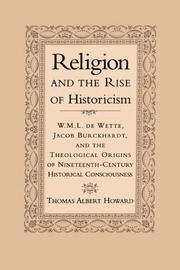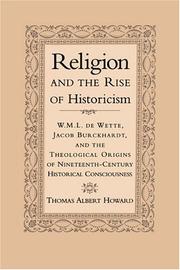| Listing 1 - 2 of 2 |
Sort by
|

ISBN: 9780521026338 Year: 2006 Publisher: Cambridge : Cambridge university press,
Abstract | Keywords | Export | Availability | Bookmark
 Loading...
Loading...Choose an application
- Reference Manager
- EndNote
- RefWorks (Direct export to RefWorks)
This book offers an interpretation of the rise of secular historical thought in nineteenth-century Europe. Instead of characterizing 'historicism' and 'secularization' as fundamental breaks with Europe's religious heritage, they are presented as complex cultural permutations with much continuity; for inherited theological patterns of interpreting experience determined to a large degree the conditions, possibilities and limitations of the forms of historical imagination realizable by nineteenth-century secular intellectuals. This point is made by examining the thought of the German theologian W.M.L. de Wette and that of the Swiss-German historian Jacob Burckhardt. Burckhardt's meeting with de Wette and his subsequent decision to study history over theology are interpreted as revealing moments in nineteenth-century intellectual history. By examining their encounter, its larger historical context, and the thought of both men, the book demonstrates the centrality of theological concerns and forms of knowledge in the emergence of modern, secular historical consciousness.
Bibelkritik --- Historicism. --- Historicism. --- Historieforskning --- Historism --- History --- History --- Historia --- Historia --- Religiösa aspekter --- Kristendom --- Historia. --- Religious aspects --- Christianity. --- Religious aspects --- Christianity. --- Burckhardt, Jacob, --- De Wette, Wilhelm Martin Leberecht,

ISBN: 0521650224 0521026334 0511528868 9780521650229 9780511528866 9780521026338 Year: 2006 Publisher: Cambridge : Cambridge university press,
Abstract | Keywords | Export | Availability | Bookmark
 Loading...
Loading...Choose an application
- Reference Manager
- EndNote
- RefWorks (Direct export to RefWorks)
This book offers an interpretation of the rise of secular historical thought in nineteenth-century Europe. Instead of characterizing 'historicism' and 'secularization' as fundamental breaks with Europe's religious heritage, they are presented as complex cultural permutations with much continuity; for inherited theological patterns of interpreting experience determined to a large degree the conditions, possibilities and limitations of the forms of historical imagination realizable by nineteenth-century secular intellectuals. This point is made by examining the thought of the German theologian W.M.L. de Wette and that of the Swiss-German historian Jacob Burckhardt. Burckhardt's meeting with de Wette and his subsequent decision to study history over theology are interpreted as revealing moments in nineteenth-century intellectual history. By examining their encounter, its larger historical context, and the thought of both men, the book demonstrates the centrality of theological concerns and forms of knowledge in the emergence of modern, secular historical consciousness.
Historicism. --- History --- Historicisme --- Histoire --- Religious aspects --- Christianity --- Philosophy --- Aspect religieux --- Christianisme --- Philosophie --- De Wette, Wilhelm Martin Leberecht, --- Burckhardt, Jacob, --- Christianity. --- 17.031.13 --- 930.11 "19" --- Historicism --- -Annals --- Auxiliary sciences of history --- Ethisch relativisme. Historicisme. Historisme. Relativisme --- Filosofie van de geschiedenis:--20ste eeuw --- -Christianity --- Burckhardt, Jacob --- De Wette, Wilhelm Martin Leberecht --- Burkhardt, Jacob --- -Ethisch relativisme. Historicisme. Historisme. Relativisme --- 930.11 "19" Filosofie van de geschiedenis:--20ste eeuw --- 17.031.13 Ethisch relativisme. Historicisme. Historisme. Relativisme --- -17.031.13 Ethisch relativisme. Historicisme. Historisme. Relativisme --- Annals --- Religious aspects&delete& --- Wette, Wilhelm Martin Leberecht de, --- De Wette, W. M. L. --- De Wette, Gulielmus Martin Leberecht, --- Burckhardt, Jakob --- Burckhardt, Carl Jacob Christoph --- History (Theology) --- Arts and Humanities --- History - Religious aspects - Christianity. --- Bibelkritik --- Historieforskning --- Historism --- Historia --- Religiösa aspekter --- Kristendom --- Historia.
| Listing 1 - 2 of 2 |
Sort by
|

 Search
Search Feedback
Feedback About UniCat
About UniCat  Help
Help News
News